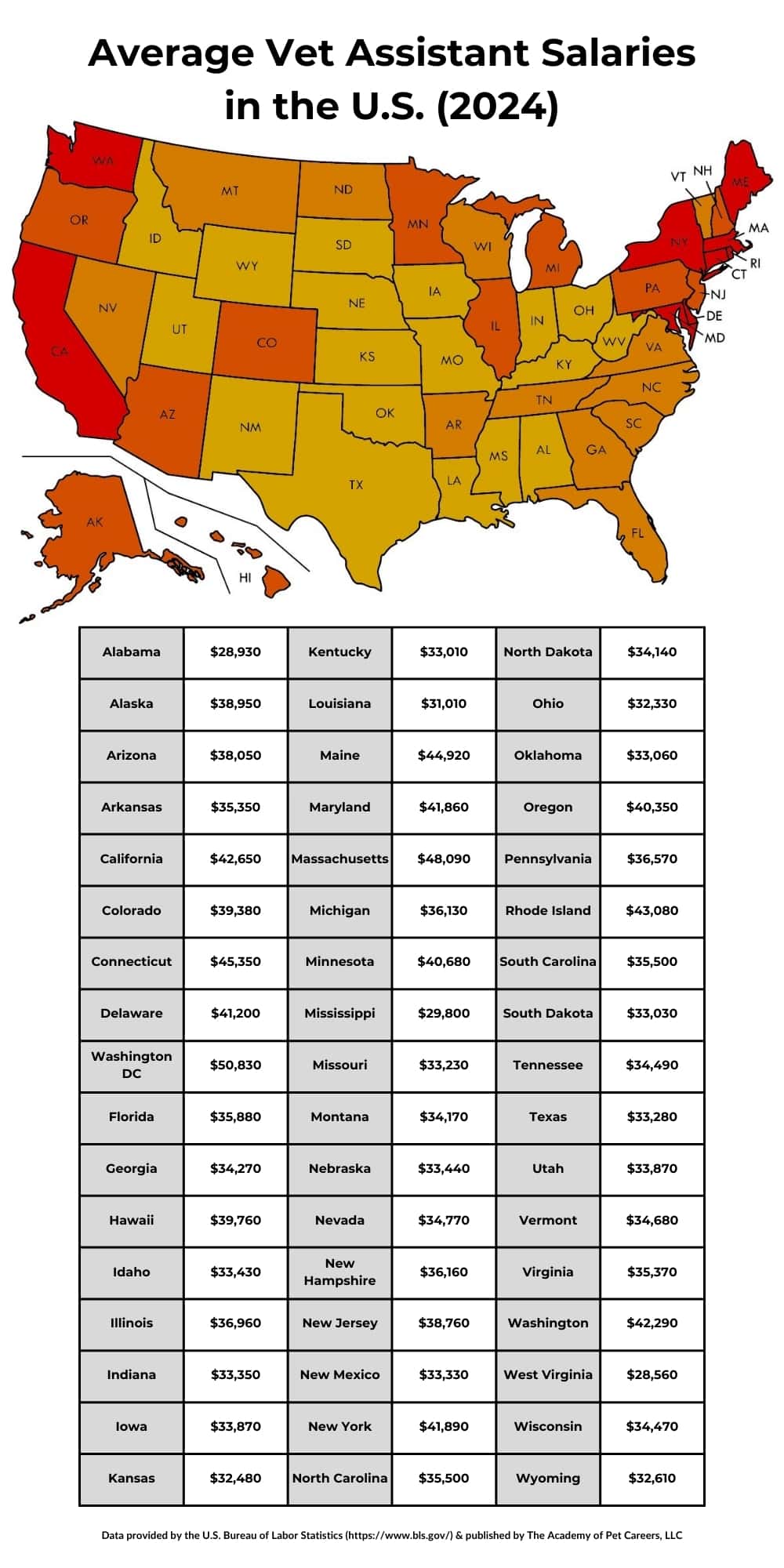How Much Do Vet Assistants Make: Income Factors and Averages

Have you ever wondered, "How much do vet assistants make?" Join us on a journey to discover the ins and outs of vet assistant salaries, from factors that influence earnings to tips on boosting your income.
If you are interested in becoming a vet assistant, you can earn a nationally-recognized certification through The Academy of Pet Careers’ veterinary assisting school.
Vet Assistant Job Description
Vet assistants are the unsung heroes of the veterinary world. They work tirelessly to ensure the well-being of our furry friends. Their roles include:
- Providing hands-on care: Vet assistants assist with animal exams, treatments, and surgeries.
- Nursing duties: They administer medications, dress wounds, and monitor patients post-surgery.
- Maintaining hygiene: Cleaning cages, sterilizing equipment, and keeping the clinic spotless.
- Client interaction: Greeting pet owners, taking histories, and offering compassionate support.
- Organizational tasks: Managing appointments, stocking supplies, and keeping records up to date.
These dedicated individuals are the backbone of any veterinary practice, helping veterinarians focus on medical care. Learn more about the requirements and responsibilities of a vet assistant.
Factors Affecting Vet Assistant Salaries
Several factors influence vet assistant salaries. Let's delve into each one:
Geographic Location
- Vet assistants in urban areas generally earn higher salaries due to the increased cost of living.
- Rural regions may offer lower salaries, but living expenses are often more affordable.
Education and Certification
- Completing a vet assistant program, such as those offered by institutions like The Academy of Pet Careers, can enhance earning potential.
- Certification from organizations like the National Association of Veterinary Technicians in America (NAVTA) can lead to higher salaries as well.
Years of Experience
- As you gain more experience in the field, your value to the practice increases, potentially resulting in salary raises.
- New vet assistants may start with lower salaries but have room for growth.
Type of Employer
- Vet assistants working at private practices, specialty clinics, or research facilities may earn different salaries.
- Academic institutions, such as veterinary schools, may offer unique opportunities and compensation packages.
Average Vet Assistant Salary
The national average salary for vet assistants in the United States is $37,310 per year. However, this can vary significantly based on the aforementioned factors. According to data from the U.S. Bureau of Labor Statistics, the top 10% of vet assistants earn over $46,000, while the bottom 10% earn at least $28,550. See below for a breakdown of salaries by state.

How to Increase Your Vet Assistant Salary
If you're a vet assistant looking to boost your income, consider these strategies:
Pursue Further Education and Certifications:
- Enroll in a vet assistant program or take courses related to animal care.
- Obtain certification from organizations like NAVTA to enhance your qualifications.
Gain Experience and Specialize:
- Accumulate more experience by volunteering or interning in specialized fields.
- Specializing in areas like emergency care, exotic animals, or dentistry can open doors to higher-paying positions.
Negotiate for a Higher Salary:
- Don't be afraid to negotiate your salary during the hiring process or annual reviews.
- Highlight your skills, experience, and certifications to justify your request.
Job Outlook for Vet Assistants
The future looks bright for vet assistants. With the growing pet ownership and increasing demand for veterinary services, job opportunities in this field are expected to rise. According to the Bureau of Labor Statistics, the employment of veterinary assistants and laboratory animal caretakers is projected to increase by 19% from 2020 to 2030, much faster than the average for all occupations.
Frequently Asked Questions
The national average salary for vet assistants in the United States is approximately $30,000 to $35,000 per year based on reports by the US Bureau of Labor Statistics.
Geographic location plays a significant role in vet assistant salaries, with urban areas generally offering higher pay due to increased living costs, while rural regions may have lower salaries but more affordable living expenses.
Vet techs typically have more formal education and training, perform more complex medical procedures, and often earn higher salaries compared to vet assistants.
Consider pursuing further education and certifications, gaining more experience, and specializing in a particular area. Don't hesitate to negotiate for a higher salary during job interviews or performance reviews.
The job outlook for vet assistants is positive, with a projected 19% increase in employment from 2020 to 2030, driven by the growing demand for veterinary services.
Understanding vet assistant salaries is crucial for anyone considering a career in animal care. While salaries may vary based on location, experience, and education, opportunities for growth and higher income are within reach. Whether you're starting your journey as a vet assistant or looking to enhance your existing career, knowledge and dedication can lead to a rewarding and financially satisfying path.
 Author - Joseph Schifano
Author - Joseph Schifano
Joseph Schifano is the owner and President of The Academy of Pet Careers. With over 20 years of experience working in the pet field, managing large scale pet care businesses, he has experience in every facet of the industry. Joseph's focus is primarily on the business of pet care but his passion is in understanding animal behavior how a dog's brain works so we can improve the care we provide as pet professionals. He is a huge advocate for Pet Empowerment and Force Free training methods. Read more in Joseph's full bio.
